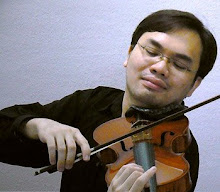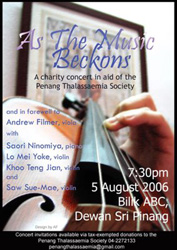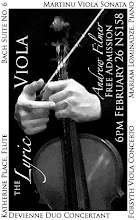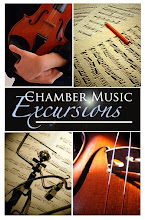Over a significant part of the past year, I've observed two interesting, and occasionally bemusing, currents in social dynamics which have come across my path. One is the interest of a surprisingly high percentage of the people I know in personality tests, of the species that Myers-Briggs would belong. And the second is of a more esoteric, and in some ways more personal, conflict of ideologies in musicology.
Personality tests, say some, provide crucial clues to why people act the way they do. And the logic is fair enough; if you figured accurately - or as in this case, I simply told you - that I was an ENFJ (Extroversion, Intuition, Feeling, Judging) personality type, this may presumably lead you to predict the course of my actions. You may even read these very words and filter them accordingly; depending on your own personality type, you may decide whether any points I make make sense to you. My intuitive actions may reveal a decision-making process that either match or counter your own. In other words, and with the caveat of generalization, personality types reveal why we do the things we do.
But in recent days, I've come to think that personality types only reveal the method of delivery - the how, and not the why, of our actions. To put this in another way, it is perhaps less inevitable that you're reading these particular opinions, as it is that I've decided to pen them in this way.
Allow me to digress. I have a notebook named A Black Fat Cat, that like many meaningful things, has a unique and personal history. It's not a diary in any sense - because I'm philosophically but not particularly logically aligned against a dairy - but part of its content are thoughts in the middle of the night, the middle of the night being when I have most of my thoughts. (This being an early morning post should now give you pause.) And what I wrote recently was: "Is seriousness in content, or in delivery?"
In a sense it deals with an issue that I've faced in my struggles in producing research content, and then dealing with the resistance it faces from the hardline, and in some cases dominant strain of musicologists. I am serious about research in music, but I've also had an unusual grounding in communications, the field in which I obtained my first tertiary qualification. Some approach presentations of research seemingly having ever-present in their mind how it would look should these very words commute themselves to the esteemed pages of published proceedings. Others - with whom I am aligned - prefer to consider the audience of the day, with the idea that content may provide stature, while delivery quite simply retains one's attention. Humour, in this case and perhaps counter-intuitively does not detract from the seriousness of the research output; it simply makes sure that attention is garnered to its delivery. It comes from an understanding that it is my job to make you or keep you interested in what I do. In this regard, I think that adapting to the situation at hand is the preferable skill, and while a script or cue cards may be useful to have as a backup in case your mind goes blank, let's hope that a blank mind is not the game plan.
This of course extends beyond simple delivery. The choice of our content establishes the same approach: whether we choose to recognize research that directly relates to the performer, or whether we prefer - and some cases, for good or for ill, establish - research that exists on a more lofty and less applicable plane. For reasons that remain somewhat inexplicable to me, those in the latter category seem to be the most critical of others, in establishing a category of musicology that explains why people sometimes say, "That may be an interesting question, but really, it's just purely academic."
At one point, I considered that the concepts towards personalities and the approaches towards musicology may be parallel. And perhaps they are indeed so. Perhaps it is a simply a clash of personalities in musicologists between those who welcome the opportunity to directly connect to a room full of strangers, and those who prefer the security not only of the third person, but a topic far removed from a personal connection. But the more I mull over the like of the Myers-Briggs, the more I realise that as effective as they may be in providing a clue to one's personality, they provide little in terms of character.
And likewise, when dealing with the kind of musicologists who create barriers and attempt to place artificial constraints on how progress of thought must be - in other words, those who want to determine the boxes from which you are to choose - there are perhaps two plausible ways to consider this. One is that is simply a conflict not of ideologies, but of personalities. For whatever reason, probably beyond what even the Myers-Briggs can predict, these researchers need the security of you fitting into their personalities.
Or it could be a second plausibility: that it is less about personality than it is about character. And while it may always be easier in life to have people about you who have personality types you work best with, it comes down to character as to how people approach those who don't fit the boxes you'd like to create.
Accommodation of those who are different, throughout history of race relations, religious conflicts, civil rights, issues of gender and sexuality and political affiliation, all come down to an essential question not of which of the 16 personality types you happen to be born into, but rather what kind of person you choose to be.
Subscribe to:
Post Comments (Atom)






No comments:
Post a Comment